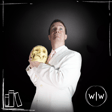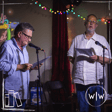Become a Creator today!Start creating today - Share your story with the world!
Start for free
00:00:00
00:00:01

234 Leigh Radford | Literary Horror Author
Literary horror author, Leigh Radford tells us all about her darkly funny debut about love and zombies as well as her writing process and learning to navigate the high pressures of publishing and the literary world.
Support the show on Patreon! 💖 And get extended episodes, ad-free and a week ahead of everyone else. 🙏
For audio listeners:
Listen to The Chosen Ones and Other Tropes, Jamie's other podcast with Melissa Welliver and Naomi Gibson! 📚
Follow on socials! 🥳
Transcript
The Gamble of Writing and Reader Expectations
00:00:00
Speaker
Oh, a spicy question. I love it. Because the writing sort of everything, right? Like you can fix plot holes, but if the writer... So some readers love that and some readers are like, but I wanted more of this. So it's kind of, it's kind of a gamble.
Introducing Lee Radford: Journalist Turned Author
00:00:14
Speaker
Hello and welcome back to the Right and Wrong podcast. On today's episode, I'm joined by a broadcast journalist, a film, television and radio producer, a former book publicist, and as of July, ah published author. It's Lee Radford. Hello. Hello.
00:00:30
Speaker
Hello, thank you for having me on, Jamie. Thanks so much for
Lee's Debut Horror Novel with a Love Story
00:00:33
Speaker
coming. Let's jump right in, starting with ah the novel, your debut novel. It's called One Yellow Eye and it's out on the 15th of July.
00:00:43
Speaker
Tell us a little bit about what we can expect to find inside One Yellow Eye. So it's being promoted as a horror novel, but I think at its heart, it's a love story.
00:00:56
Speaker
ah It's a book about how far we would go to keep the ones we love alive.
Plot: Zombie Outbreak and Protagonist's Secret
00:01:02
Speaker
ah We are in London, three months after a viral epidemic that has swept through the city and decimated its population, leaving locals terrified that the virus will return.
00:01:16
Speaker
um The virus has all the classic hallmarks of a zombie virus. It's spread are aggressively by biting and virently virulently and fast.
00:01:28
Speaker
And the infected have those physical symptoms of the lumbering date and the bloodlust, the bleeding from the eyes, etc. And locals living in London have been forced to haplessly dispatch their infected relatives and loved ones with bricks and shovels and any old kitchen implement they have to hand to support the government's extermination programme.
00:01:55
Speaker
The infected have been rounded up and destroyed to stem the spread. So three months after the initial outbreak, as far as everybody is aware, all of the infected zombies have been rounded up and destroyed.
00:02:08
Speaker
except for one who secretly is handcuffed to the radiator in the spare bedroom of his flat, where his wife, Tester, a biomedical scientist, is working day and night and increasingly desperately to bring him back from the undead.
00:02:28
Speaker
I see. there's There's a lot to unpack there. ah My first question was, what an interesting setting, because obviously we're all very familiar with zombie apocalypse stories, but most of those stories either take place at the start of the outbreak or sort of during the sort of zombie wasteland thing.
00:02:50
Speaker
right It's cool that you're kind of picking up at the sort of like resolution of it after after the zombie, what you would traditionally assume is where the story would take place with this setting. what what What made do you think, oh, this will be an interesting time to just like pick up the story?
Character Under Stress: British Crisis Reaction
00:03:05
Speaker
i think a couple of different reasons. Firstly, we needed to get to Kesta at a point where she is already really stressing out. carrying the weight of this horrible secret for three months is making her drink excessively making her paranoid really freaking her out and she's having to conceal this awful secret from friends and family and of course from the authority so she's we needed to reach her at a point where she's already beginning to fray um partly because
00:03:40
Speaker
ah I hope the reader will understand the very difficult decisions she makes thereafter in her efforts to try and cure her husband. um I also felt that three months after something really terrible had happened, the British reaction to that would be quite specific and unique.
00:03:59
Speaker
We would probably be getting quite tired of not being able to go out. slightly infuriated by government inactivity, the inefficiency of the cleanup.
00:04:10
Speaker
So I think having it a suitable time afterwards, away from that kind of freneticism, the urgency, um ah it's to a point where perhaps it's become a little bit commonplace. People are still in a state of shock, but they are fundamentally trying to reorder their lives, repriority reprioritise their lives and get back to normal.
Gallows Humor and Relationship Tribute in the Novel
00:04:34
Speaker
And if there's one thing that Kester can't do, it's get back to normal. So um we find her at a point where perhaps she is really expressly at odds with the rest of London.
00:04:47
Speaker
And that makes, um I hope, for a more engaging read. Yes. and it is And it is sort of darkly funny as well. there is It's not all doom and gloom ah all the time.
00:05:00
Speaker
i think it's, I hope it's darkly funny. And I think it's because if anybody has been through something that is particularly challenging, the only way to live through it is to kind of make light of it and to try to see you know, the light at the end of the terminal and to convince yourself it's really not an oncoming train. It is hope and positivity and that you will survive it. So I think there's a lot of gallows humour in it.
00:05:26
Speaker
um yeah And I think it's also, i hope, a marker of the kind of relationship that she has, not just with the people that she works with, but also her husband. This is the The humour in it, I think, is perhaps her paying tribute to the relationship that she is losing incrementally.
00:05:45
Speaker
um He is with her, but he's obviously fundamentally and profoundly changed. But the humour she tries to um keep going with him, i think, is just an extension of the relationship that she's trying to preserve for as long as possible.
00:06:01
Speaker
Well, it's, it's, it's a great concept. It's a great setup. It's a great pitch. Um, uh, I'm excited for, for it to come out for everyone to read it and kind of get to experience it. Um, I'd love to talk a bit, kind of changing pace a bit here.
00:06:16
Speaker
I'd like to get a bit more into go back a bit, I guess, uh, and talk about you
Lee's Writing Journey from Journalism to Novelist
00:06:21
Speaker
and your writing. So is this the first novel that you have written or have you been writing for, for a long time?
00:06:30
Speaker
It's the second novel I've written. um I had always harboured a desire to write. And the jobs that I've had in the past have involved um writing to um probably a lesser degree when I was a journalist, writing copy and, um you know, writing scripts for other people to deliver um on the radio, that kind of thing.
00:06:55
Speaker
um And I've always read avidly, but I honestly never felt that I had anything particularly meaningful to write about. And I struggled, I think, um earlier in my life, like perhaps a lot of people do, um to find my voice.
00:07:11
Speaker
And the really nice thing about writing is you can kind of come to it when you found that voice at almost any age. So um I didn't actually write a full novel until after my dad died.
00:07:27
Speaker
um He died at the end of 2020.
Inspiration Behind 'One Yellow Eye': Personal Experiences
00:07:29
Speaker
And One Yellow Eye is very much inspired by my experiences of nursing him. um He was um diagnosed with acute myeloid leukemia, but obviously his end of life care we had to provide during the pandemic. So that heightened the stress um for our family and also the difficulty of providing any quality of life to him at a point when we were in lockdown. So i think it triggered a lot of emotions for me and things that I needed to work through and progress um and process.
00:08:05
Speaker
um So I wrote her first book maybe the year after he died, but I think it will probably always remain unpublished and hidden in a drawer somewhere because I think it's probably just...
00:08:18
Speaker
an outpouring of rage, really. yeah um And um I did sub it out to um literary agents and I, not very many, um but it was rejected.
00:08:30
Speaker
um And historically, I think I would always have given up at that point and and taken that as, okay, that's proof. You can't write. You shouldn't try to give up. Go back under a rock, you know, yeah that kind of thing.
00:08:44
Speaker
And I knew this might sound melodramatic, but I think I was always worried. Gosh, if you publish something, ah if you get bad reviews or people don't like it, how will you deal with that?
00:08:55
Speaker
And when my dad died, I realized that the absolute worst thing that could happen to me had happened. And it sort of took the pressure off. And realised that, i you know, any bad reviews would be survivable.
00:09:08
Speaker
And I had to try because living and not trying had to be much worse than then trying and failing. um And it didn't, of course, um i wasn't giving my myself the opportunity to try and succeed.
Developing Writing Skills: Courses and Practice
00:09:23
Speaker
So um i had another idea for a novel, which was um for One Yellow Eye. And um I decided that I would undertake creative writing course for a period of months to force myself to work on ah second draft and or on a second novel. um And so that second book is One Yellow Eye.
00:09:46
Speaker
Oh, OK. Was that um the the course you did? Was that the Faber Academy? Yes. um So Faber and Faber is obviously an independent heritage publisher of Great Note,
00:09:58
Speaker
obviously very associated with C.S. Eliot and a lot of mid-century um poets. um But they publish Sally Rooney. They um they they have ah ah you know an amazing um that list of authors.
00:10:11
Speaker
um And they run ah creative writing courses and have done for a number of years now under the brand Faber Academy. And um i I felt it would be really helpful because um it would bully me into sticking to a schedule and to delivering things in a timely fashion um with a deadline. Because as an ex-journalist, I quite like deadlines. The worst thing for me is staring into the abyss and not having anything that I have to deliver for anyone. So I thought it would be a tentative, um hopefully pleasant way of receiving some peer feedback from other um writers.
00:10:51
Speaker
And it would also get me into the into the ritual of writing, not just to exercise my grief, but actually to write in a way that delivered a plot and produced a readable manuscript.
00:11:06
Speaker
um And I don't know that you always know that you can do that, even if you feel, well, I think I can write. Actually working within the confines of a structure and a narrative arc and um producing characters that make sense to people,
00:11:23
Speaker
um is still a bit of a new thing, certainly for me. um And, but so the course was incredibly helpful. And at the end of the course, um they produce what they call an anthology, which um includes just, I think it was a thousand words um from the beginning of your novel.
Connecting with an Agent via Faber Academy
00:11:47
Speaker
And they send the anthology out to the ah literary agents who are actively looking for new clients which as any unpublished writer will tell you ah it's hard to know who is and isn't closed to submissions as far as the literary agencies are concerned and many of them will say they're open but they're not because they are inundated um with and new submissions um and I've I've learned just how invested a literaryate a good literary agent will be in helping you develop your manuscript and find your voice and help you sell your book. so um
00:12:28
Speaker
having that, I won't say, well, no, I will say the path of least resistance it helps you to approach people who are already warm to being approached in the first place rather than contacting um literary agents cold.
00:12:46
Speaker
um No matter how much research you've tried to do about what they are interested in, if they're already expecting that submission, um i think it just boosts your chances of being signed.
00:12:59
Speaker
um So when the anthology went out from Faber Academy, Hayley Steed at Jankler and Nesbitt was the first agent to get in touch with. And we met pretty quickly and developed a rapport. And she signed me and within a couple of months had sold um the UK rights department at Millen. So once I'd connected with her, um the rest was pretty quick. So i think when the book comes out on the 15th of July, it will be exactly two years since she and I met.
00:13:34
Speaker
Wow. Okay. Yeah. Cause I was going to ask, cause I was talking to a few authors who have been through the Faber, whether it be the Faber Academy or there's there's other writing courses that also do that. And that they'll have similar sort of agent events or things at the end of them.
00:13:49
Speaker
um But sometimes it's the case that the, they, they find an agent later on. So I was going to ask if that came straight from that. It's good. It's good to hear that, you know, that, that does happen. And I've spoken to Hayley on this podcast ah
The Role of a Supportive Agent in Publishing
00:14:01
Speaker
before.
00:14:02
Speaker
ah She's great. Does she, um because I know that you work in in sort of film, television, radio as well. Does she exclusively work on your on your prose or does she also have input on your kind of like film, television bits?
00:14:16
Speaker
I keep her abreast of everything that I'm doing, but she works exclusively on books for me. um And I think what was fantastic about her, what is fantastic about her is that of all of the agents that I've come into contact with over the years, actually back when I was working as a journalist um and anything I've done on the fringes of the publishing industry,
00:14:40
Speaker
um i i wonder sometimes if it's a British thing, but you can often feel like they're politely finding ways to tell you no. And if you are low on confidence or or you you know have crippling self-doubt about your writing abilities,
00:14:57
Speaker
it can really knock you for six. And I think the thing I liked about Hayley immediately was she was so positive on email. um She always looked for ways to say yes.
00:15:08
Speaker
She was incredibly kind, very well read, very thoughtful in her feedback. And she came across as motivated. Like I knew that if she took me on as a client, she would work hard on my behalf and if she I wanted to kind of earn her trust as quickly as possible by meeting the deadlines that she set for me.
00:15:31
Speaker
um and then, you know, I think it's it's it's worked very well um for both of us over the last couple of years. um But she makes me feel like things are achievable, that things are positive.
00:15:43
Speaker
um And she gives great feedback. I think she very quickly got a feel for success. Who I was as a person, as well as how I wanted to approach writing. um She also loves football, so we can talk about football. She's a West Ham fan.
00:16:00
Speaker
I'm a jaded Arsenal supporter. Always a client's mate. um which is a bit of nice light relief um but i I think it's one of those things where where you don't have a literary agent you can't begin to imagine how that working relationship will pan out and actually I don't know what I'd do without her now because she's such a fantastic um kind of touch point for me to um run ideas by and um she always makes manages to make me feel better about whatever it is that I'm trying to work on so
00:16:33
Speaker
um it I would almost do um i would recommend the Faber Academy course to anybody um if it gets them in the position um that I was in, which is in front of absolutely the right kind of agent for them.
00:16:49
Speaker
Okay. Yeah. I think I've said it many times on this podcast and talking about on my other podcast as well. The importance of the relationship between an author and and an agent going sort of beyond just the logistical business side of things. Like that there's much more to that relationship than just here's some words, sell the words.
00:17:10
Speaker
We're selling the words. his I'm doing the paperwork kind of thing. it Yeah. It's a very personal, close relationship. And I think for a lot of writers, I i had tried to educate myself about the realities of the publishing industries before I even put you know pen to paper.
Understanding the Publishing Market with an Agent
00:17:26
Speaker
But for a lot of people, they are coming to it cold. And the thing that your agent does, if you really listen to them, is they are kind of a gateway into acquiring quite quickly a much deeper understanding of the market, what the market wants, what it's looking for.
00:17:46
Speaker
And if you can work with your agent um with that in mind, I think it makes for um an easier transition from not being a writer to being a writer because you can kind of understand a little bit better how you're going to fit in to this world that you might have dreamed of um working in.
00:18:06
Speaker
um But that naturally at the beginning, you're really struggling kind of to get um a footing in it. So I think having... Having an agent who can effectively serve as a friend and a guide through that while you're getting used to it um is, you know, invaluable.
00:18:24
Speaker
Yes. And, um, it's, uh, I was, I don't think of it as it's much more a partnership than, you know, a client, um, relationship. It's, um, there was, uh, an agent I spoke to way back at the beginning of the podcast. I think she's no longer an agent now, but she used to describe it, describe her in quotes clients as like her partners in crime more than anything else. You know, that's what, how she felt about that relationship.
00:18:52
Speaker
I think that's true. And i i I hope it is the same for the agent. That's nice to hear an agent say it. I think when you're a writer, because so much of your work is done in isolation, having a partner in crime takes the edge off that anxious feeling that you're launching something into the into the ether to be judged um on its own merits and you are singularly responsible for it and they make you feel like it's kind of a joint effort and i think that can be quite soothing actually yeah yeah absolutely um we are at the point in the episode where i um
00:19:33
Speaker
pack up your things and put you on a boat and ship you off to the desert island where I will ask you, Lee, if you were stranded on a desert island with a single book, which book do you hope that
Lee's Favorite Book: 'Mrs. Dalloway' by Virginia Woolf
00:19:45
Speaker
it would be? I'm gnarled over this because I feel like, like most people, the books I would read on the beach are their own genre and You don't really take incredibly challenging, difficult works if you're trying to have a holiday.
00:20:05
Speaker
But since this is, I'm stranded on this dirt island and therefore I probably need to push myself to the limits to get off it or to stay alive until rescue comes.
00:20:16
Speaker
um I think I would probably have to take Mrs. Dalloway by Virginia Woolf because I've read it twice And I think I could read it. It's one of those books you could read once a year for the rest of your life and take something new away every single time you read it.
00:20:36
Speaker
And it's such a strange novel. And it's such an ah an upsetting novel. It's very discombobulating to read because you're never quite sure whether your you're having a flashback or a flash forward or and because it's this constant sort of stream of consciousness with no set chapters.
00:20:59
Speaker
And um it's this extraordinary, um preamble it feels to getting to mrs dalloway's party but you realize that it's the journey to getting to the party and and the people attending it are the things that matters not not the event at all um so i think it's a just a breathtaking book and actually um was published 100 years ago this year so i think it came out in like may 1925 nineteen twenty five so um
00:21:30
Speaker
I think it's just a novel everybody should read. And um ah yeah, I could read it forever and never tire of it and always learn something new on it on a next reading.
00:21:41
Speaker
Wow. I mean, an incredibly high praise. i think a lot of people have... an annual read, you know, they they'll have that one book that they read annually, but most of the time from the people I've spoken to, it's a very comfortable, easygoing, like a, like a Jane Austen or a Dickens or something.
00:21:59
Speaker
Um, this, you know, this is much more to kind of wrap your teeth around in terms of something that you read annually. So very high praise that you, you would say, this is a book you could read every, every year and and take something new out of it.
00:22:12
Speaker
Yeah, I think, I think so. And I think, um, i I don't know if this is just me, but I think often before you get published, other people's contemporary works can feel really intimidating because people who are getting published and you're not, or you haven't completed your manuscript, they can make it feel more daunting.
00:22:32
Speaker
And I think I've probably always taken comfort in classic novels or, um you know, because um it it doesn't feel quite as difficult to,
00:22:45
Speaker
This is somebody's past success.
Balanced Reading for Writing Inspiration
00:22:47
Speaker
This is something that if you read it, it's going to make you better as a writer. Hopefully you have so much to learn. There are so many novels to read and not enough time to read all of them. um But I think the one thing that I'm definitely focusing on doing more and more is reading more broadly.
00:23:07
Speaker
um because and and meeting much much more commercial and contemporary fiction so that the next book that I write whenever that comes out is kind of singing in the same tone as um as everybody else um but I think it can so I've probably avoided reading quite a lot of books over the years because they felt like other people's achievements where I wasn't getting on with writing whereas now I'm much i hope much better at reading for pleasure and reading to just admire other people's what I've been reading Virginia Fato a lot um recently um just coming to the end of Mrs March and i think she's just astounding and i I can't wait to read her next book i mean
00:23:53
Speaker
Victoria and Psycho only came out in January, so I'm putting the pressure on her rather unfairly. um But now it feels much more like a joy rather than, um you know, I don't want to read and seethe with jealousy, but I think perhaps sometimes I've been guilty of doing that.
00:24:08
Speaker
um So now reading actually just feels like a great celebration, which is really nice. I think I know I've never really thought about it in those terms before, but I know exactly what you mean. And I, I feel the same way. Sometimes so there's something, there's a safety in reading a classic, something that was, you know, written 50 years ago, plus that you, you're kind of like, Oh, this is brilliant. And you can really, I feel like you can let your guard down and really appreciate it. And then sometimes I'll read something that's not even like that contemporary.
00:24:40
Speaker
Um, you know, like ah I'll read something like, well, last I read the Watchmen by Alan Moore. And I remember sort of at the end of each chapter, there's these just, it's hard to explain unless you've read the novel, but the graphic novel, but the almost at the end of every chapter, I'd sort of close the book, sit back and just think, this man is a genius and I will never attain this level of like intellect. It's it's impossible.
00:25:05
Speaker
And it's so intimidating. You know, as a writer, it can be like a really scary thing to be like, this person is alive and exists and I will never be able to write like this. But I think Yeah, you're right. There's something, yeah, I'd not thought about it.
00:25:17
Speaker
Classics to so feel like a safe place from that. I think they do. And i I don't know whether it's just an indicator of our education system. I'm i'm not sure, but it's like, ah there are a lot of books that feel like prescribed texts that you just have to read before you die because you just have to read them before you die.
00:25:36
Speaker
And everything else um is kind of gravy, but you're working at a time before the people, your contemporaries will, of course, there will be some who will be elevated to kind of Virginia Woolf status um with the passage of time and kind of looking at other people's careers and wondering how they're managing to achieve the things that they are achieving. i mean, I would mention Olivia Blake, who just knocked me for six when she gave me a blurb for my book. And I had no idea that she was even open to doing blurbs because she's so busy. But she produces novels, each one ah kind of standalone genius novels, but so rapidly. And that pace is kind of formidable.
00:26:24
Speaker
And intimidating. And I think it's really hard because you if you you write so often in isolation and you're reading your work in isolation and you're reading everybody else's work in isolation.
00:26:38
Speaker
And so it kind of is a breeding ground for I don't know, writerly neurosis really, because you can't help but see what other people look like they're doing. And then you have to remember that, of course, in a different way, they are doing the same thing that you're doing.
00:26:54
Speaker
They're trying to churn out their books. They are seeing what other people are doing. They do have the pressures of their publishers and and their readers. um and the pressure to to deliver and and and all that kind of stuff is um keenly felt, I think, by everybody, even the ones who look like they just make it easy and who make the rest of us feel really intimidated.
00:27:17
Speaker
um I think it's just par for the course. And once you accept that, I think you can be a little bit easier on yourself, you know, give yourself less of a hard time and actually just focus on the things that you're trying to do.
00:27:30
Speaker
um One thing that I have found lovely um in my very limited ah experiences of being a writer is how positive and open other writers have been in providing blurbs and just saying,
00:27:45
Speaker
nice words to you at events and things um so again it makes you or it certainly made me feel less alone and like you're kind of part of a gang who all share similar concerns and tribulations and fundamentally just a love for telling stories Yeah, I completely
The Positive Publishing Community
00:28:07
Speaker
agree. And the, I don't know if it's like a, ah if it's always been like that, but yeah, my experience of um just being in publishing events and things like that is the authors and and and the people around them, the agents, the editors, it's just, everyone's so friendly and everyone's just excited about the next kind of great book. And they're just excited for us all, everyone to sort of um rise up together as ah there's less sort of treading on each other's shoulders and things, which I think is great.
00:28:33
Speaker
Next up, ah we're going to chat a bit about process.
Additional Content and Upcoming Book Release
00:28:37
Speaker
I've also got some questions about Lee's work in in production, her production company, and the differences between publishing novels versus film, TV, radio. That will all be available in the extended episode, which you can find at patreon.com slash right and wrong.
00:28:53
Speaker
um Reading other people's work and experiencing how they do something that either you take for granted or seems completely alien to you um is a real privilege. And there's always somebody who's got a better way of doing something or saying something than you have. And you can, you know, absorb it, I think.
00:29:15
Speaker
um And um yeah, it's it's a joy. Yes. Yeah, absolutely. I mean, like you say, two different disciplines, but there's obviously parallels and, you know, you can transfer skills from one to the other and vice versa. Um,
00:29:31
Speaker
Yeah, great stuff. Well, thank you so much, Lee. It's been really great chatting with you and hearing all about your kind of writing and your publishing journey as well as a bit about your experiences in in television. and ah fingers crossed for you and your husband, I hope that the production company and your things take off. Sounds like he has a really good thing going.
00:29:52
Speaker
um for everyone listening one yellow eye is out uh 15th of july in all the usual places to see you'll be able to get it um but thank you so much lee for coming on podcast it's been so nice chatting with you and and meeting you And likewise, Jamie, thank you very much for your time. And thank you to everybody for listening.
00:30:11
Speaker
If anyone listening wants to keep up with what Leigh is doing, you can find her website, leighradfordauthor.com. To support the podcast, like, follow and subscribe. Join the Patreon for ad-free extended episodes and check out my other podcast, The Chosen Ones and Other Tropes.
00:30:24
Speaker
Thanks again, Leigh. And thanks to everyone listening. We will catch you on the next episode.



















